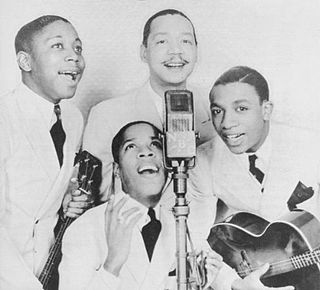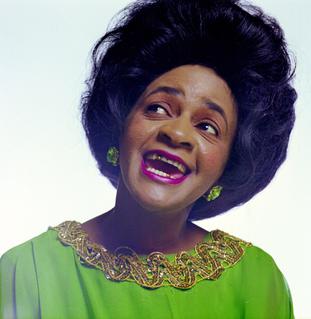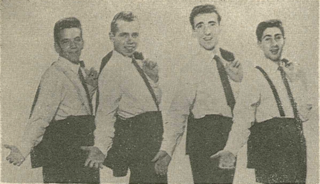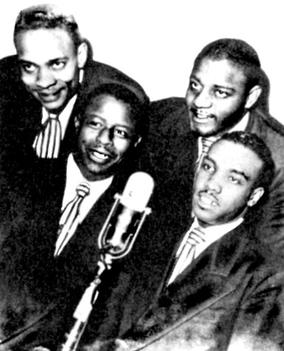Related Research Articles

Doo-wop is a genre of rhythm and blues music that originated in African-American communities during the 1940s, mainly in the large cities of the United States, including New York, Philadelphia, Pittsburgh, Chicago, Baltimore, Newark, Detroit, Washington, D.C., and Los Angeles. It features vocal group harmony that carries an engaging melodic line to a simple beat with little or no instrumentation. Lyrics are simple, usually about love, sung by a lead vocal over background vocals, and often featuring, in the bridge, a melodramatically heartfelt recitative addressed to the beloved. Harmonic singing of nonsense syllables is a common characteristic of these songs. Gaining popularity in the 1950s, doo-wop was "artistically and commercially viable" until the early 1960s, but continued to influence performers in other genres.

Parliament-Funkadelic is an American music collective of rotating musicians headed by George Clinton, primarily consisting of the funk bands Parliament and Funkadelic, both active since the 1960s. Their distinctive funk style drew on psychedelia, outlandish fashion, science-fiction, and surreal humor. They released albums such as Maggot Brain (1971), Mothership Connection (1975), and One Nation Under a Groove (1978) to critical praise, and scored charting hits with singles such as "Tear the Roof Off the Sucker" (1975) and "Flash Light" (1978). Overall, the collective achieved thirteen top ten hits in the American R&B music charts between 1967 and 1983, including six number one hits. Their work would have an influential effect on subsequent funk, post-punk, hip-hop, and techno artists of the 1980s and 1990s, while their collective mythology would help pioneer Afrofuturism.

The Ink Spots were an American vocal pop group who gained international fame in the 1930s and 1940s. Their unique musical style predated the rhythm and blues and rock and roll musical genres, and the subgenre doo-wop. The Ink Spots were widely accepted in both the white and black communities, largely due to the ballad style introduced to the group by lead singer Bill Kenny.

The Oak Ridge Boys are an American country and gospel vocal quartet originating in Oak Ridge, Tennessee. The group was founded in 1943 as the Oak Ridge Quartet. They became popular in Southern gospel during the 1950s. Their name was changed to the Oak Ridge Boys in the early 1960s, and they remained a gospel group until the mid-1970s, when they changed their image and concentrated on country music.

Clara Mae Ward was an American gospel singer who achieved great artistic and commercial success during the 1940s and 1950s, as leader of the Famous Ward Singers. A gifted singer and arranger, Ward adopted the lead-switching style, previously used primarily by male gospel quartets, creating opportunities for spontaneous improvisation and vamping by each member of the group, while giving virtuoso singers such as Marion Williams the opportunity to perform the lead vocal in songs such as "Surely, God Is Able", "How I Got Over" and "Packin' Up".

Danny & the Juniors was an American doo-wop and rock and roll vocal group from Philadelphia, Pennsylvania, originally consisting of Danny Rapp, Dave White, Frank Maffei and Joe Terranova. Formed in 1955, they are most widely recognized for their 1957 no. 1 million-selling hit single "At the Hop". Their 1958 follow-up, the anthemic "Rock and Roll Is Here to Stay", also became a classic.
The Five Blind Boys of Mississippi was an American post-war gospel quartet. They started with lead singer Archie Brownlee, their single "Our Father" reached number ten on the Billboard R&B charts in early 1951. Then the screams of their new lead singer Big Henry Johnson captivated audiences all over the world. Jimmy was the heart of the group and the longest standing member. It was one of the first gospel records to do so.

The Jordanaires were an American vocal quartet that formed as a gospel group in 1948. Over the years, they recorded both sacred and secular music for recording companies such as Capitol Records, RCA Victor, Columbia Records, Decca Records, Vocalion Records, Stop Records, and many other smaller independent labels.

Judy Clay was an American soul and gospel singer, who achieved greatest success as a member of two recording duos in the 1960s.

Meet the Temptations is the debut studio album by the Temptations for the Gordy (Motown) label released in 1964. It includes most of the group's early singles, excluding only the first, "Oh Mother of Mine", and its b-side, "Romance Without Finance" ; as well as the single "Mind Over Matter", in which the group is credited as The Pirates. The album consists entirely of previously released singles, including the group's first hit single, "The Way You Do the Things You Do".

Ann Cole was an American R&B and gospel singer who has been described as "a genuinely great soul singer who had the misfortune to be too far ahead of her time". She had several minor hits in the late 1950s and early 1960s, but is now most noted as the original performer of "Got My Mojo Working", later popularised by Muddy Waters.

"Heat Wave" is a 1963 song written by the Holland–Dozier–Holland songwriting team. It was first made popular by the Motown vocal group Martha and the Vandellas. Released as a 45 rpm single on July 9, 1963, on the Motown subsidiary Gordy label, it hit number one on the Billboard Hot R&B chart—where it stayed for four weeks—and peaking at number 4 on the Billboard Hot 100.

David Prater Jr. was an American Southern soul and rhythm & blues singer and musician, who was the deeper baritone/tenor vocalist of the soul vocal duo Sam & Dave from 1961 until his death in 1988. He is a member of the Rock & Roll Hall of Fame (1992), the Grammy Hall of Fame, the Vocal Group Hall of Fame, and the Georgia Music Hall of Fame (1997), and he was a Grammy Award–winning (1967) and multiple Gold Record award-winning recording artist.
The Larks were an American vocal group, active in the early 1950s. They were not the same group as the Los Angeles-based Larks featuring Don Julian, nor the Philadelphia-based group The Four Larks.
New Birth is an American funk and R&B group. It was originally conceived in Detroit, Michigan by former Motown songwriter/producer, Vernon Bullock and co-founded in Louisville, Kentucky by him with former singer and Motown songwriter/producer Harvey Fuqua and musicians Tony Churchill, James Baker, Robin Russell, Austin Lander, Robert "Lurch" Jackson, Leroy Taylor, Charlie Hearndon, Bruce Marshall and Nathaniel "Nebs" Neblett (1946–2016).
Ed Wiley Jr. was an American tenor saxophonist whose big sound and soulful expression helped lay the foundation for early blues, R&B and what would later come to be known as “rock-and-roll” music.
"Check Yourself" is a 1961 song that was released as a Miracle label single by Motown singing group The Temptations; and written by Motown president Berry Gordy, and group members Otis Williams, Melvin Franklin and Elbridge Bryant, and produced by Gordy. It was the group's second single, as well as their second and last single for the Miracle label, which was deactivated immediately after this release. Starting with the next single release, the group's future recordings for Motown would be issued under the Gordy label until it was deactivated in 1988.

"Milky White Way" is a gospel standard written by Lander Coleman, who was a quartet singer for the Coleman Brothers. The song became a million-selling hit record in 1947 when the CBS Trumpeteers, a black quartet from Baltimore, recorded it. In the late 1940s the CBS Trumpeteers had a popular morning radio show over the CBS network called 7:15 A.M.! and "Milky White Way" was their theme song. Elvis Presley also recorded a version on October 30–31, 1960, at RCA's Studio B in Nashville, Tennessee.
"Maybe the Last Time" is a song written by James Brown and recorded by Brown and the Famous Flames in 1964. It was released as the B-side of "Out of Sight" and was also included on the Out of Sight album. Brown described it as "a heavy gospel-based number, all about appreciating friends and everything while you can because each time you see somebody may be the last time, you don't know." It was the last studio recording Brown made with the Famous Flames, although the singing group continued to perform live with him for several more years.

The Trumpeteers were an American gospel group formed in Baltimore, Maryland, in 1946. Adopting stylistic influences from the Golden Gate Quartet, the ensemble's most enduring song is their take on "Milky White Way", later covered by Elvis Presley.
References
- 1 2 3 4 Cummings, Tony. "The Coleman Brothers". Cross Rhythms . Retrieved March 6, 2017.
- ↑ "Coleman Brothers - Biography". Allmusic . Retrieved March 6, 2017.
- 1 2 3 Warner, Jay (2006). American Singing Groups: A History from 1940s to Today . Hal Leonard Corporation. p. 20.
the coleman brothers vocal group.
- ↑ Marion, J.C. "Raise a Ruckus: The Coleman Brothers". EarthLink. Retrieved March 6, 2017.